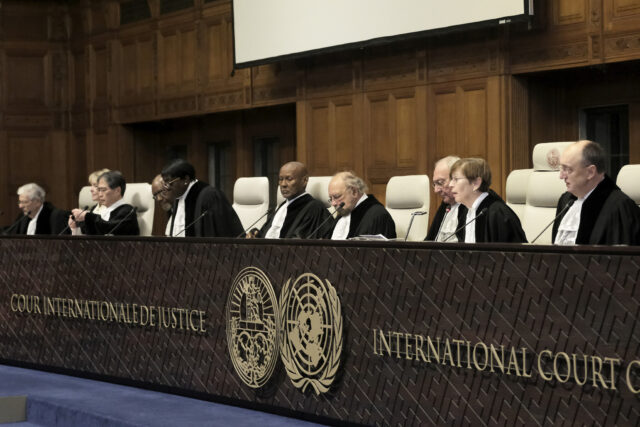Earlier today, the ICJ issued its decision on South Africa’s request for the indication of provisional measures—in effect, an injunction—against Israel in regard to alleged violations of the Genocide Convention in the context of the Israel’s use of force in response to the Oct. 7, 2023, Hamas-led attacks in Israel. The Court found that it had jurisdiction because South Africa and Israel are parties to the Genocide Convention but disagree on the interpretation and application of that Convention in the Gaza context. The Convention provides for ICJ jurisdiction in such circumstances.
The Court reminded the parties that, at this stage of proceedings, its decision is preliminary and without prejudice to final decisions about jurisdiction, facts, and merits. The Court concluded that it had a basis for indicating provisional measures based on the plausibility of South Africa’s claim that Palestinian rights under the Convention might be at risk in Gaza and that therefore protective measures were in order. In this connection, The Court found that the Palestinian people were a distinct group within the meaning of the Genocide Convention and thus entitled to protection against genocide. At the same time, the Court noted that it was not obliged to indicate the provisional measures South Africa had requested.
By majorities from 15-2 to 16-1, the Court then required Israel to take all steps within its power to prevent acts of genocide within the meaning of the Genocide Convention—“killing members of the group [Palestinians], causing serious bodily or mental harm to members of the group; deliberately inflicting on the group conditions of life calculated to bring about its physical destruction in whole or in part; and imposing measures intended to prevent births within the group.” Israel is to prevent and punish “direct and public incitement to commit genocide in relation to members of the Palestinian group in the Gaza Strip.” Israel is to ensure that its armed forces do not commit genocide. Israel is to ensure to the extent it can the provision of humanitarian assistance to the people of Gaza. Israel is to protect evidence of genocide. And Israel is to report within one month from today on its compliance with the Court’s order.
The Court did not explicitly say that its requirements were subject to intent. But the Genocide Convention requires “intent to destroy in whole or in part, a national, ethnical, racial or religious group, as such.” Therefore, one may safely conclude that, so long as Israel does not intend to commit acts that violate the Genocide Convention, conducting military operations in accordance with the laws of war in Gaza or elsewhere is permitted. Unintended civilian deaths that occur in the course of military operations do not constitute either war crimes per se or acts of genocide.
The Court emphasized that its conclusions were based on resolutions, reports, and statements by U.N. bodies and U.N. and other officials in the public record. The Court did not take such reports or words as definitive. It emphasized that none of the facts alleged could be independently verified at this time. This statement by the Court applied even to U.N. estimates of the size of Gaza’s population.
ICJ judges are elected by, and responsive to, the U.N. General Assembly and Security Council. The ICJ thus is a political body. Its judgments, especially in cases such as the one brought by South Africa, must be understood against this background. As is well known to those who have served in foreign ministries, some judges consult with, and take direction from, their governments prior to issuing decisions.
What did the Court actually do? At bottom, it reminded the parties and the world that “thou shall not commit genocide” and, to the extent of one’s capability, shall protect people at risk of genocide. It reminded all fighters that they are obligated to conform to the laws of war—“international humanitarian law”—something we know that Hamas and its associates do not do. As a matter of international law and Israeli domestic law, including decisions of Israel’s Supreme Court, Israel must comply with IHL and, in the words of Israel’s President quoted by the Court, does so. And the Court called for the unconditional release of the hostages seized by Hamas on Oct. 7, 2023.
The Court thus did not indicate the provisional measures requested by South Africa. These included finding that Israel had breached the Convention and owed the Palestinian people reparations for such breach.
The Court did not find that Israel had violated or was violating the Genocide Convention. Thus, Israel should have no difficulty complying with today’s order by the ICJ.
Nicholas Rostow is Senior Partner at Zumpano, Patricios & Popok PLLC and Senior Research Scholar at Yale Law School. This article first appeared in Just Security.






